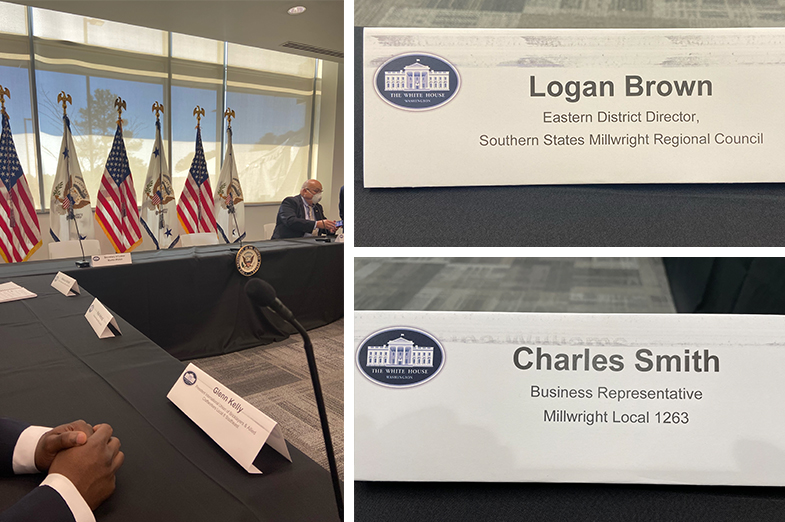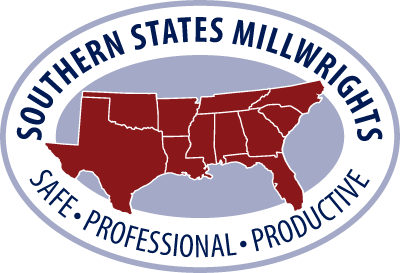

Two SSMRC staff members were among a small group of union leaders who met with the U.S. vice president and labor secretary in Durham, North Carolina, on March 2, sharing concerns about unfair competition from law-breaking contractors and about the need for government policies that support contractors who hire skilled workers and provide good wages and benefits.
The roundtable discussion was held after Labor Secretary Marty Walsh and Vice President Kamala Harris spoke during a visit to Durham Technical Community College. Walsh and Harris chose North Carolina as the location to speak about “good-paying, union jobs” because of the state’s low rate of union membership. North Carolina and South Carolina are the United States’ least unionized states, with 2.6% and 1.7% of workers belonging to unions in 2021, according to the U.S. Bureau of Labor Statistics.
Walsh and Harris met with Charles Smith, business agent covering the Carolinas for Millwright Local 1263, Logan Brown, director of the SSMRC’s Eastern Region, and 13 other labor leaders. The vice president and labor secretary challenged the union leaders to increase membership density and asked what challenges they face in accomplishing that goal and how the Biden administration could assist.
“I am utterly amazed that both of them would spend time and resources to sit down with us for 45 minutes and ask us to share our concerns,” Brown said. “It shows genuine care and not just words. Personally, it gave me a lot of respect for this administration because its actions are showing what its policies are saying.”
Brown and Smith discussed worker misclassification and visa fraud and abuse as obstacles for the SSMRC and its partnering contractors. When companies hire labor brokers to bring in misclassified workers and when unscrupulous contractors fail to follow visa-program requirements for worker pay and benefits, law-abiding contractors have a difficult time competing, they said. Abuse of the Visa Waiver Program at the SK Innovation battery plant near Commerce, Georgia, is one example.
Brown asked what division of the Labor Department monitors work visas. Walsh said staff in his office are working on the visa-program-abuse issue, and significant action is expected in a couple years. The Labor Department is close to an agreement with the Department of Homeland Security, Walsh continued, to sign a memorandum of understanding so undocumented workers can report unfair labor practices to the Labor Department without fear of U.S. Immigration and Customs Enforcement intervening. “It will be like whistle blower protection for undocumented workers,” Brown said.
Local government support for jobs that provide fair pay and benefits also could help grow union membership, Smith and Brown said during the roundtable discussion. “Our state politicians work against us daily,” Smith said after the meeting. “They sell their souls to corporate interests to bring companies to our state and promise to union bust when they get here.” Projects partially paid for with local tax dollars often aren’t built with local labor and don’t provide the promised high-quality jobs.
“Having someone like the vice president and labor secretary helping us will go a long way in increasing membership,” Smith said.
The Biden administration has already been doing things to help workers, unions, and law-abiding contractors, Brown said, noting the recently signed executive order requiring project labor agreements on large federal construction projects as one example. North Carolina has a law banning project labor agreements on state-funded projects.
Numerous labor grants and support of union apprenticeship programs are other ways the administration has been assisting workers in getting the training they need and providing a pipeline of skilled labor for contractors. The discontinuation of the Industry-Recognized Apprenticeship Program and the cancellation of a rule that imposed unjustified and burdensome paperwork requirements on labor unions are examples of actions that have benefited unions. The establishment of the White House Task Force on Worker Organizing and Empowerment and the Apprenticeship Ambassador Program are assisting unions, their partnering contractors, and members as well.
Walsh and Harris listened closely to the concerns labor leaders shared, and their staff members took a lot of notes, Brown said. They also toured the International Brotherhood of Electrical Workers apprenticeship center on the community college campus and spoke with apprentices. The two will hold similar meetings with labor leaders in cities across the country.
Union leaders who participated in the roundtable represented electricians, ironworkers, pipefitters, bricklayers, millwrights, and members of the AFL-CIO. Most were part of the North Carolina State Building and Construction Trades Council, and the SSMRC was invited to attend the event because of Smith’s membership in that group. He has been involved in the organization for many years and is part of its Bylaws and Constitution Committee.
Brown and Smith also scheduled a follow-up meeting with the construction department head at Durham Technical Community College to learn more about how the SSMRC could put its graduates to work. Two of the department’s programs — the industrial maintenance program and the welding program — provide excellent foundations for millwright training.
